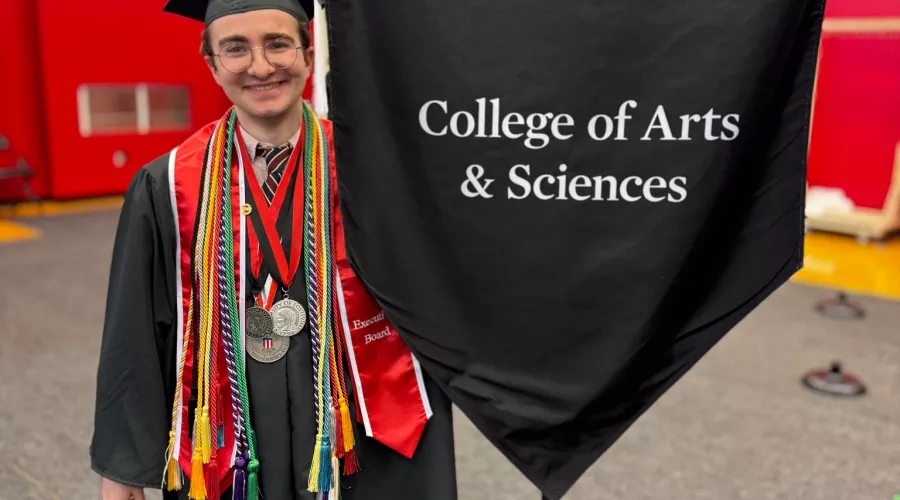A Philosophy and Humanities Double Major Came to UofL with a Plan—Then Found Something Even Better
May 19, 2025
Tuesday Shaw
By Stephanie Godward, Communications and Marketing Director, College of Arts & Sciences
Tuesday Shaw began his time at UofL as a homeschool student who felt overwhelmed as a freshman, determined to maintain a rigid plan for himself and for his academic endeavors.
But this May, Shaw graduated as a clear and confident double major and winner of the Woodcock Medal who values the magic that can come with being flexible and open to new and unexpected experiences, now headed to Moldova to study Russian as a Boren Scholar.
“I was so overwhelmed coming into college that I just needed to have everything figured out,” Shaw said. “Once I started following the plan, I didn't really like it. It's like the things I wanted to do weren't exactly what my plan set out to do, but I was just following the plan anyway.”
Everything changed after Shaw completed a community-engaged research internship during the summer after his freshman year —one that he accidentally applied for and did not intend to pursue initially. This experience led to Shaw studying food justice and disparities between Louisville’s East and West Ends, and he unexpectedly became deeply involved in local projects addressing these issues. Although food justice hadn’t been part of his original plan, the hands-on experience was eye-opening and ultimately rewarding.
“It was an amazing time, and it was really difficult, too, but I just learned so much that I hadn't even thought I needed to learn,” Shaw said. “It just kind of turned my life around. I was so in my head at the beginning of college, but doing this internship, every day was completely unplanned and unexpected. We were really figuring things out as we went along, but it really got me out of my head and thinking spontaneously and on my feet.”
Shaw now has degrees in philosophy and comparative humanities, along with a minor in Russian and a certificate in ethics. An honors student and two-year student director at the Cardinal Cupboard campus food pantry, another result of his “accidental” internship experience, Shaw was also selected as the Woodcock Medalist for the College of Arts & Sciences just before graduation; the most prestigious faculty-awarded recognition in the college.
Along the way, he allowed himself to explore and consider other topics, like anthropology.
“I chose philosophy as a major because it's more of a method than just a subject that you study. I think it is really relevant to lots of different things, and you can apply it in different ways to pretty much anything,” Shaw said.
After switching his second major from anthropology to comparative humanities, Shaw was able to delve into his passion for not just studying text but also studying the context of different pieces of literature.
“I feel like I've been lucky to have been able to study so many different things as part of the humanities major. And I think having an interdisciplinary approach is really important to the academic work that I've done before and what I want to do in the future,” Shaw said.
Shaw’s interest in Russian began with a love for playing Russian folk music on the accordion in high school. That curiosity soon deepened into a fascination with Russian culture and literature, especially after reading classic Russian novels over a summer.
A translator’s note in one of those novels highlighted the emotional weight of a single letter in the Russian language, sparking a desire to understand the texts in their original form—and ultimately inspiring him to study Russian.
"I just felt like, how many other parts of this novel am I not understanding because I'm not reading it in the original language? So that really set me on the determination to learn Russian. And I started teaching it to myself in high school,” Shaw said.
Examining the context of literature and other works of art is important, especially while living in a complex, global society. As a philosophy and humanities major with a minor in Russian language, he is particularly interested in connecting work instead of bracketing it off, for example, when considering global events like the Russian invasion of Ukraine.
"Instead of just cutting off Russian literature and culture and saying, ‘We're not going to talk about this anymore,’ it's important to still look at those things and read those works. It is important to do that in connection to all of these places that have usually not been able to speak for themselves and present themselves as they want, because Russia has been so powerful. I think reading Ukrainian authors, and other current works, in addition to Russian classics, is something that I'm interested in doing more in my career,” Shaw states.
Being able to think about and examine multiple conflicting perspectives at the same time, instead of choosing one and then cutting off all other opinions, is a skill he has developed while studying the Russian language during this time period as well.
Shaw’s next —and somewhat initially unplanned —stop, is traveling to Moldova on his recently accepted Boren Scholarship.
“After a year, I plan to come back to the U.S. and do a master's degree, probably in Russian and Eastern European studies, and then work for a while after that. Eventually, I want to do a PhD in either Slavic languages and literatures or comparative literature,” Shaw said.
Related News




